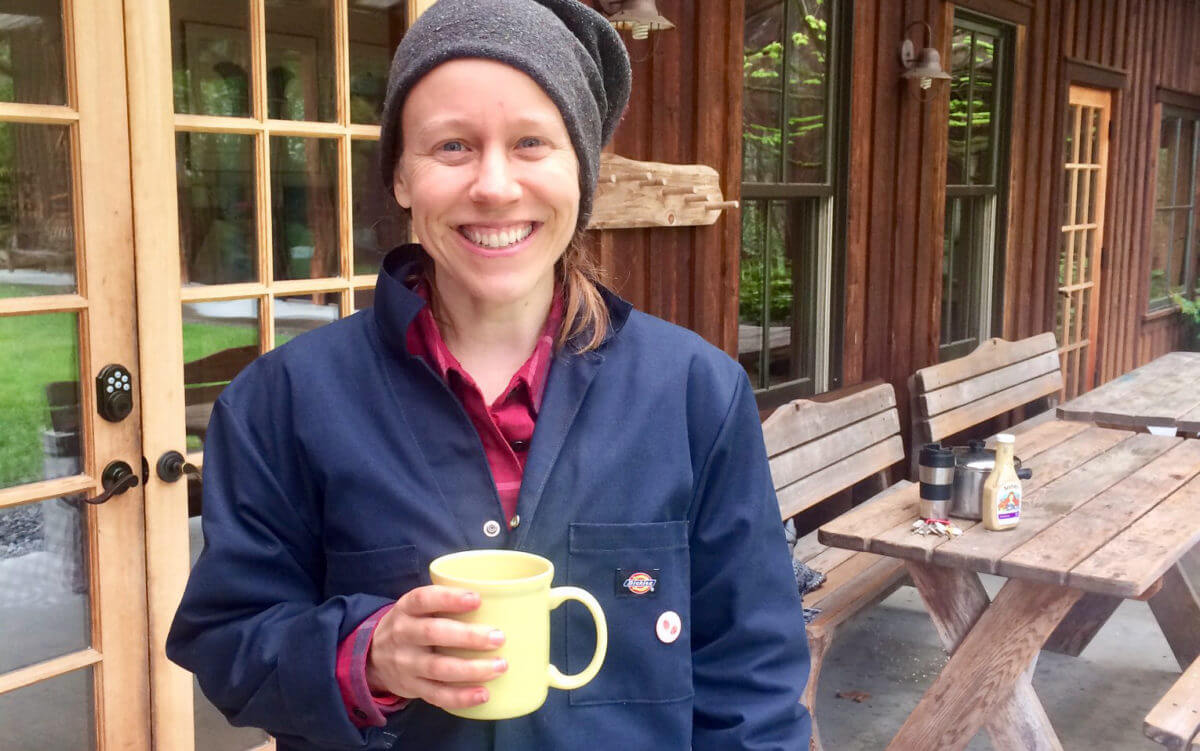I recently connected with Sarah Goettsch, a Whidbey Institute program alumni and volunteer who comes up from Seattle whenever she gets the chance. Here’s our conversation. —Marnie Jackson
What got you interested in volunteering with the Whidbey Institute?
I came to know the Whidbey Institute through Powers of Leadership (POL) in 2017. That came at a time of pretty big upheaval in my life, personally and professionally. Looking back, I see that I knew at the time, “this is the place that’s going to help rework who I am becoming.” I don’t know what would have happened if I didn’t have the grounding of the Whidbey Institute and Powers of Leadership at that time in my life. One of the things I’ve found about the Whidbey Institute is that all of you—staff, participants, volunteers—are filled with generosity and care. It’s a certain way of being in the world that allows individuals to shine. I’ve felt so cared for, and without a lot of funds it made sense to consider volunteering as a way to stay involved.
[Volunteer Coordinator] Marta was in my POL cohort, and I think she dropped the seed of thought for volunteering, working in the garden, working on the trails.
What volunteer project or activity have you particularly enjoy(ed)?
I remember when the new cabins went in and there were a bunch of new plants to get in. It was almost overwhelming at first—we had this mass of plants to put in the ground, and then all the people showed up and everything just started getting in the dirt. I had fun and learned a lot that day. Volunteering at the Whidbey Institute isn’t just showing up to do what you’re good at—there’s also a learning component. Learning what Oregon grape is, learning with Jules in the garden, understanding what plants work well together, taking a tomato plant home because she had too many starts. I love the symbiotic relationship between me as a volunteer with the place and the staff.
At the Summer Open House Picnic, I really wanted to be out front greeting people even though I’m an introvert. [Whidbey Institute founders] Fritz and Vivienne walked up, and I didn’t know who they were. I welcomed them, asking, “have you ever been here before?” They got big smiles on their faces. There’s a real openness and caring here that I don’t find in a lot of other places. I’ll name it as a grounded gratitude—that’s what it feels like.
“There’s a real openness and caring here that I don’t find in a lot of other places. I’ll name it as a grounded gratitude.”
What else should we know about you, or about what you love?
It’s so wonderful to be asked, “who are you? What brings you joy?”
Let’s see: I’m enamored with birds and their songs. Part of that is learning to listen better, and birdsong is a connection to the outdoor world. I love to walk trails and pathways, explore libraries and post offices. I worked in communications for a while. I love thinking about you, Marnie, in your role at the Whidbey Institute. It’s the beautiful side of communications. I revive by reading, gardening, digging in the dirt, and riding my bicycle, preferably with a bell and helmet.
I am a poet, though for a while I buried the poet part of me. POL helped me dig that up and brush it off. I just had a poem published as part of an art show with Project Onward in Chicago and it was incredible—it gives me a way to talk about my work. Writing can be so internal, and not always easily shared. I’m still discovering how to share poetry in a way that feels safe and celebratory.
In what ways do you think the Whidbey Institute can evolve to be of greater service?
“Every time I go to the Whidbey Institute there’s a welcome and a combination of acceptance, on one hand, and a gentle expectation, on the other, to really get in and show up.”
One thing that comes to mind is the tension between being in a known community and the opportunity to invite new people in. How does an Institute on an island not be an ‘island’? How does the Whidbey Institute come to the attention of those people it most wants to reach? I was lucky to discover it. A woman that I worked with said, “Call Christie and talk about POL.” Maybe that’s the magic of it, how the web reaches.
How do we reach certain populations? In part, it’s a physical challenge. If I didn’t have a personal vehicle, it would be very difficult to get to the Whidbey Institute. Is there something I could do to help people get up to the island if they’re flying or taking the bus or train? From where I live in West Seattle, the commute could involve something like four buses, the ferry, and a taxi.
What did getting connected to this organization make possible for you?
So much gets lost in this world. In some ways, it may be easier to not be hopeful. If I’m operating individually, I can lose hope. Every time I go to the Whidbey Institute, I am welcomed and accepted, and there is a gentle expectation to be present—to really get in and show up. That allows me to rekindle. It’s a reminder that there’s good work going on. Let’s get in and find the hope!
In POL, I felt like the people in the room could and should do a lot of good work together. I felt like we could save the world. There’s something special about the people that the Whidbey Institute combs into itself. What unfolds when we come together, asking good questions, and letting all of those perspectives filter in . . . it’s magical.

